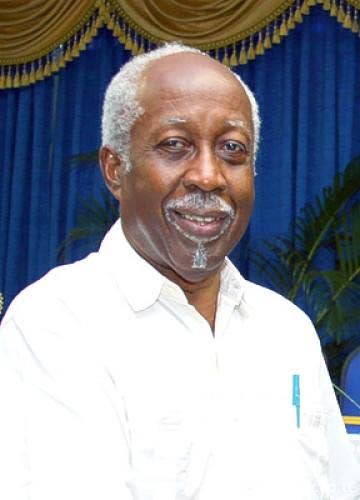An unsettled Tobago

Reginald Dumas
THERE IS the now notorious audiotape, at present the subject of official investigation. While THA Chief Secretary (CS) Farley Augustine hasn’t identified the two voices on the tape, he has in essence admitted that they belong to people of his circle, which was having “strategic discussions.” At such discussions, he says, various “options” are considered.
I agree. But I would have reacted very differently. Constantly mindful of my party’s 2021 campaign slogan (“leh we fix dis”), I would never have raised such an “option.” And if someone else had, I would immediately have slapped it down, reminding everyone that we couldn’t credibly adopt the same behavioural patterns of which we were accusing our predecessors. I note, however, that in his recent budget presentation the CS said he was “ready and prepared to deal decisively with…even the mere appearance of corruption.” I see.
Augustine has his supporters, of course: “everybody does do it” is a favourite, cynically absurd, defence – two or more wrongs make a right, apparently. Just the same, might there be subversives in his ranks? Who even thought of recording the discussion? Who leaked it? To whom? Why?
The tape isn’t all. The Environmental Management Authority (EMA) has taken the THA to court over a road on whose construction the THA hadn’t sought the EMA’s input. The matter will be heard soon in the High Court, and I hope the 1996 THA Act, that marvel of legislative smoke and mirrors, comes again under scrutiny.
Not only the EMA. The former executive chairman of Studley Park Enterprises Ltd (SPEL) has challenged his abrupt – and, for him, illegal – removal from office a few months ago.
There is also the issue of alleged favouritism shown by the previous assembly to one construction company. Here too the THA faces legal action. And what of the Prime Minister’s public assertion that the THA had in fact sought funding from the central government to settle its debt to that company, among others?
But what of road contracts awarded by today’s THA administration? I’ve seen a proposal from a company for construction and rehabilitation of roads. It’s dated August 30, 2022, the THA letter of acceptance September 7, 2022. Only one week needed to carry out a due diligence exercise and make a judgment on a proposal worth more than $50 million?
But what really surprised me was that it was only on September 20, nearly two weeks after the contract award, that the company submitted “method statements” describing how it proposed to carry out the work. Is that normal procedure?
And there is, as we know, the ongoing saga of the vacant post of THA chief administrator. First, however, let’s look again at that 1996 THA Act. It says in part at section 71(3) that “The chief administrator…shall be responsible for such division as may be assigned to him by the Chief Secretary.” That language suggests that the chief administrator doesn’t necessarily sit in the CS's office but can be moved about by the CS. If that is a possible interpretation, I would be very careful if I were the CS. I’ll tell you why.
Many years ago, when I was head of the Public Service, I assigned – on what I thought correct professional advice – a public servant from one ministry to another. The Public Service Commission promptly descended on me. An assignment was in fact a transfer, I was firmly told, and only the commission had the constitutional power to transfer public servants. My decision wasn’t reversed, but I was duly put on notice. I pass my experience to the CS, any CS.
These days, however, the chief administrator question has assumed another, much more worrying, dimension: it has degenerated into a very public slanging match between the Prime Minister and the Chief Secretary, each accusing the other of duplicity and political smartmanship.
The PM has vowed never to interact again with the CS unless a third person (of his choice, I assume) is present, such is his distrust of the CS. For his part, the CS has insinuated that the PM wanted a particular person as chief administrator in order to help save his friends fingered in an audit report commissioned by the THA. He has also indicated that the PM has supplanted Satan as “the most deceitful character in the universe.” The PM has indignantly rejected all the Chief Secretary's assertions and promised to resign if he were found not to be speaking the truth.
But how do all these gladiatorial confrontations benefit Tobago? Its socio-economic development? The desire for internal self-government? And after all the turbulence, might the new acting CA be so unfortunate as to be perceived essentially as a political functionary, thus lacking credibility?


Comments
"An unsettled Tobago"